Overview
Paediatric Haematology Oncology & BMT is a unique department at HCG that focuses on the diagnosis, treatment and management of benign and malignant haematological disorders and oncological problems seen among children and adolescents. Paediatric haematologists are specialists who treat children with blood disorders which could be benign or malignant (cancerous). Paediatric oncologists are specialists who treat children with cancer.
Health conditions seen in children cannot be treated the way they are treated in adults. Also, both the diagnosis and management of problems in children are best managed by doctors managing children with these problems. Children may not be able to answer the medical questions properly or cooperate for medical exams and close involvement of parents is essential. Paediatric haematologists /oncologists are trained specialists who are well aware of how to interact, examine and treat young children and teens in a way that makes them feel at ease.
The discipline of paediatric haematology encompasses a broad spectrum of health conditions including, primary immunodeficiency disorders, thalassaemia, sickle cell disease, aplastic anaemia and other bone marrow failure syndromes, iron-deficiency anaemias, megaloblastic anaemias, other refractory anaemias, autoimmune blood cell disorders, bleeding disorders, white blood cell disorders, Platelet disorders and blood cancers.
Paediatric oncology includes cancer of the blood (blood cancer), lymph nodes, bone and soft tissues, brain tumors and other solid tumours.
Paediatric Haematology Oncology & BMT at HCG, KR Road, Bengaluru
At HCG, we house a team of a highly skilled and well-experienced team of paediatric haematologists/ oncologists, who are trained to examine, treat and manage a broad array of blood disorders, including cancers with utmost attention, expertise, empathy, care and compassion.
We have a multidisciplinary team that comprises paediatric haematologists/oncologists, bone marrow transplant specialists, radiation oncologists, surgical oncologists, pathologists, radiologists, genetic experts, molecular experts, palliative care specialists and rehabilitation specialists – all of whom are well-versed in addressing the special needs of children with blood disorders and cancers.
At HCG, children can receive value-based and patient-centric care for the following conditions:
- Acute lymphoblastic leukaemia
- Acute/chronic myeloid leukaemia
- Aplastic anaemia
- Bone marrow failure syndromes
- Thalassaemias and other blood disorders
- Hodgkin’s lymphoma & Non-Hodgkin’s lymphoma
- Brain tumours
- Bone tumours – Osteosarcoma and Ewing’s sarcoma
- Hepatoblastoma – Liver tumours
- Neuroblastoma
- Retinoblastoma
- Rhabdomyosarcoma and other soft tissue sarcomas
- Germ cell tumours
- Immunodeficiency syndromes
Paediatric Oncology Facility at HCG Cancer Centre, KR Road, Bengaluru
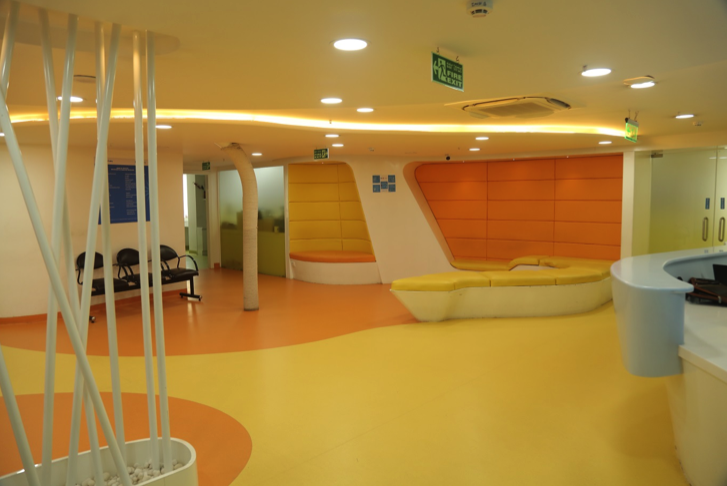
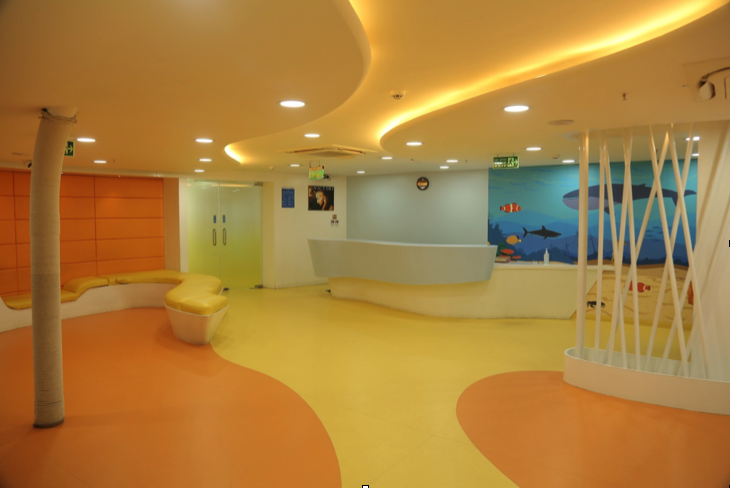
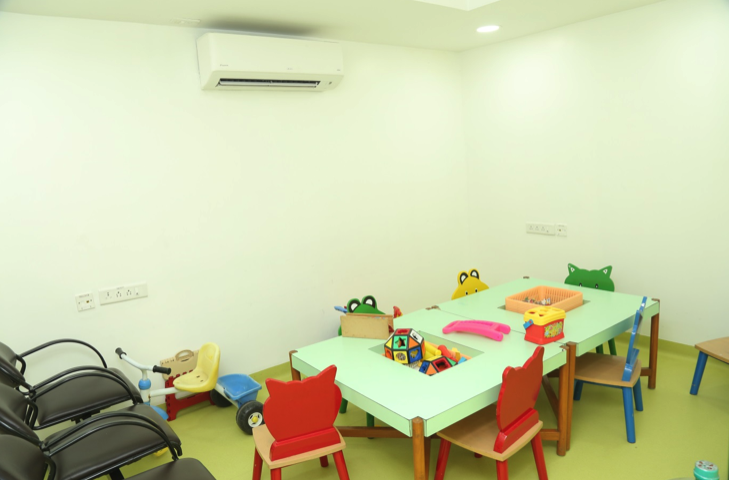
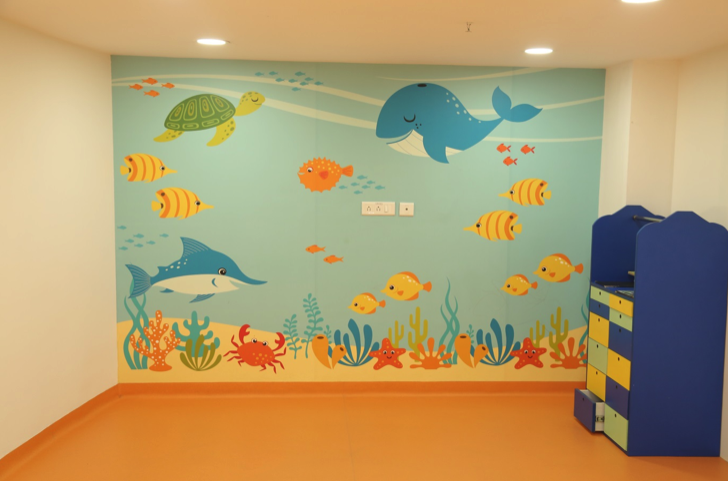
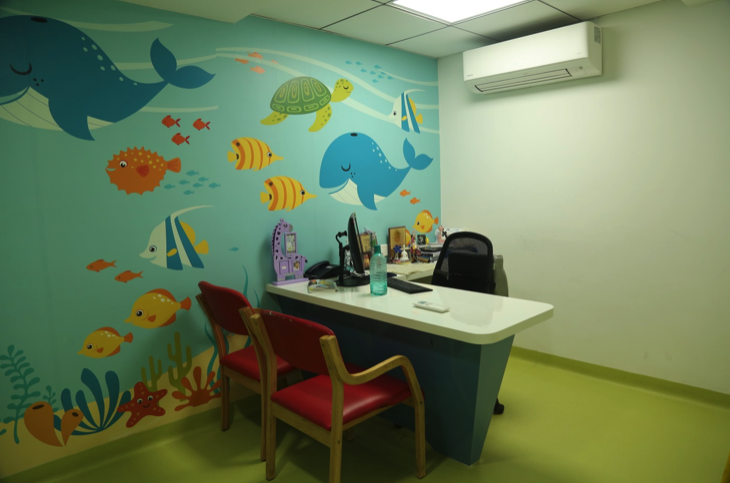
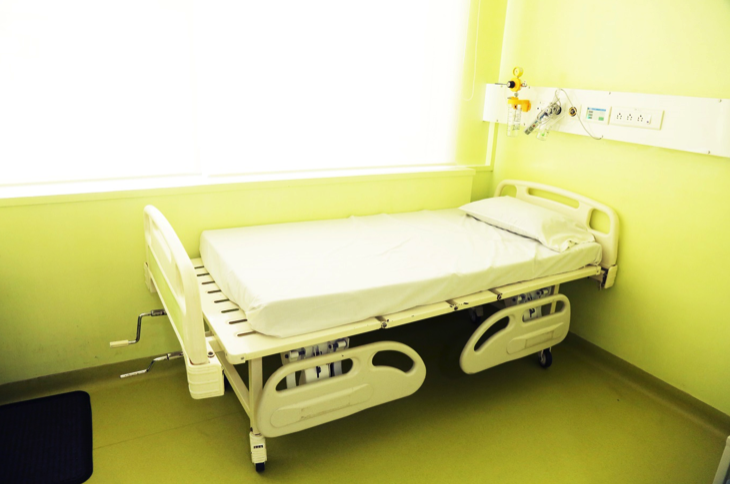
Frequently Asked Questions
1. What does a paediatric haematologist/oncologist do?
A paediatric haematologist/oncologist specialises in diagnosing, treating and managing the following health conditions among children and adolescents:
- Blood disorders, including the diseases of white blood cells, red blood cells, platelets, etc.
- Bleeding and clotting disorders
- Malignant disorders like leukaemia, lymphoma, brain tumours, bone tumours and solid tumours
- Bone marrow transplant
2. When to consult a paediatric haematologist/oncologist?
Detecting cancers in children is often challenging as the symptoms are similar to those of less serious paediatric conditions. However, there is one difference. In the case of cancers, the symptoms do not go away – as the time passes, they tend to get worse. It is important to get such symptoms tested by a paediatric haematologist/oncologist.
High index of suspicion is the key for early diagnosis. Being in close follow up with a paediatrician is essential; whenever there are some symptoms which are difficult to explain with normal illness or persistent symptoms, paediatrician will refer you to meet a paediatric haematologist/oncologist.
Following are some of the main symptoms that should not be ignored among children:
- Prolonged, unexplained fever
- Pain that lasts for more than two weeks in any part of the body
- Frequent headaches with or without vomiting, especially early morning headache
- Tiredness, fatigue
- Pale skinSudden changes in the vision
- Unexplained weight loss
- Presence of a lump or swelling in any part of the body
- Bruising or bleeding
- Limping
It is important to note that these symptoms could be caused due to other health conditions too, and not cancer alone. However, it is important to consult a specialist to be sure whenever there is doubt.
3. What causes cancers among children?
Majority of childhood cancers do not have a known cause – almost 95% of the cases. However in some children, there can be some known risk factors. The risk factors seen among children are a lot different than those seen among adults. Following are some of the risk factors that lead to increased cancer risk among children:
- Specific Genetic Disorders: Childhood cancers are not inherited in most cases. However, there are a few inherited genetic disorders that can increase a child’s risk of developing cancers:
- Klinefelter syndrome
- Bloom syndrome
- Ataxia telangiectasia
- Li-Fraumeni syndrome
- Familial platelet disorder syndrome
- Fanconi anaemia
- Wiskott-Aldrich syndrome
- Constitutional mismatch repair deficiency syndrome
- DICER1 syndrome
- Familial adenomatous polyposis (FAP)
- Hereditary neuroblastoma
- Hereditary paraganglioma-pheochromocytoma
- Hereditary retinoblastoma
Certain cancers are hereditary, too:
- Certain Infections: Infections caused due to Epstein-Barr virus and HIV are associated with increased cancer risk among children, especially Hodgkin’s and non-Hodgkin’s lymphoma.
- Problems Associated with Development in Womb: Poor foetal development is also associated with an increased risk of childhood cancers.
- Environmental Exposures: Studies show that prenatal or infant exposure to pesticides, fertilizers, etc., can increase the risk of cancers among children.
- History of Cancer Treatments: Those children who have undergone cancer treatments previously are at an increased risk of getting diagnosed with cancer again (secondary cancers – especially due to radiotherapy or chemotherapy). Regular follow-ups, however, can reduce the risk of recurrences.
4. How are paediatric cancers diagnosed?
High index of suspicion is the key. There are multiple testing methods used to diagnose cancers among children. Following are some of the commonly recommended testing methods:
- Blood Tests: Complete blood counts, peripheral smear study, blood tests to check levels of specific tumour markers in the body.
- Bone Marrow Aspiration and Biopsy: Sample is collected from bone marrow for diagnosis of blood cancer, type of cancer and other studies. Bone marrow examination would also help in diagnosing aplastic anaemia and other bone marrow failure syndromes.
- Biopsy: A biopsy is recommended for a definitive diagnosis of various cancer types. During the procedure, a small amount of tissue from the suspected area is collected and examined under a microscope for the presence of cancer cells. Further special tests are done to categorise the type of cancer.
- Imaging Tests: Imaging tests like MRI scan, CT scan, bone scan, PET-CT scan etc., are recommended to determine the exact location of the tumour, its size and its stage. This information is necessary to plan appropriate treatment. These tests are also used for radiotherapy planning, therapy monitoring, restaging and relapse evaluation.
5. How are paediatric blood and immune disorders treated?
Depending on the type, the stage and the overall condition of the patient, the treatment approaches will vary from patient to patient. A large percentage of paediatric disorders, including cancers, can be treated successfully. At HCG, we use the multidisciplinary team approach to diagnose, treat and manage a broad spectrum of paediatric disorders.
We devise personalised treatment plans that are carefully designed to help paediatric patients return to the best state of health possible.
Following are the commonly recommended treatment approaches for paediatric and immune disorders:
- Medication: Certain benign blood disorders can be successfully managed with the help of medications.
- Blood transfusion: Blood transfusions are commonly recommended for the management of thalassaemia, some sickle cell anaemia kids, aplastic anaemias and other bone marrow failure syndromes, etc.
- Chemotherapy: Chemotherapy is recommended to manage cancers related to bone marrow and other solid tumours.
- Bone Marrow Transplantation: The bone marrow cells that are destroyed during chemotherapy are replaced with healthy, functioning bone marrow cells during bone marrow transplantation. Bone marrow transplants are considered to be a curative approach for various blood disorders among children and teens.
- Surgery: Surgery may be recommended in the management of solid tumours, such as bone and brain tumours. Depending on the severity of the case, radiation therapy may be administered along with surgery.
- Radiation Therapy: Radiation therapy uses high-energy radiation beams to destroy tumour cells. Radiation therapy is used as a supportive treatment in the case of various paediatric cancers.
Along with these treatments, patients will also be provided with supportive care, which includes rehabilitation care, follow-up support, psychosocial support, etc.
6. Are all paediatric cancer treatments toxic?
No – not all paediatric cancer treatments are toxic. Treatments like high-dose chemotherapy, immunotherapy, usage of immunosuppressants, etc., may lead to certain levels of toxicity in patients. However, they can be easily managed with the help of medications and other interventions.
Before the treatments, parents can talk to the expert team to get a better understanding of what to expect from the treatments given to the patients. Throughout the treatment, the expert team will be with the patient, and if there is any severe side effect observed, the team will ensure to address it first and then continue with the treatment.
7. What should the parents of paediatric cancer patients know?
It is normal for parents to be extremely worried upon hearing their child’s cancer diagnosis. At HCG, we employ personalised treatment approaches to treat each one of our patients and ensure that they achieve the best state of health possible at the earliest.
We often see parents having a hard time explaining to children about their condition. We encourage parents to have honest and welcoming conversations with their children as these build trust, and also help children understand what to expect and be prepared for it.
Parents must also help their children cope with any sort of negative or difficult emotions. Parents can also take the help of psycho-oncologists, who understand the psychological distress experienced by paediatric cancer patients and help them to manage it efficiently.

